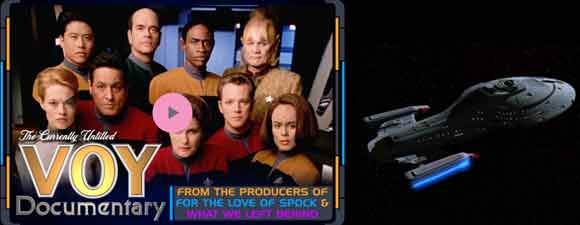Retro Review: Random Thoughts
6 min read
randomthoughtsbanner
On a planet of telepaths, Torres is arrested when her violent thought causes a man to commit a crime.
Plot Summary: As the Voyager crew comes to the end of a pleasant visit with the peaceful Mari, a man bumps into Torres in the marketplace and momentarily enrages her. Soon afterward, the local man, Frane, beats another man nearly to death. Chief Examiner Nimira, who is proud that her telepathic race has nearly eradicated crime, concludes that the violent thought entertained by Torres has infected the Mari. Torres is sentenced to have her memory purged, a procedure the Doctor believes could cause brain damage. Though Paris wants to break Torres out of the Mari facility, Janeway prefers to work within local laws and sends Tuvok to investigate. The violent thought continues to circulate, causing an older woman to murder a young woman in whom Neelix has developed a romantic interest, even though neither woman was near Torres during her initial rage. Tuvok discovers that there is a black market for forbidden, violent thoughts on the planet when a local shopkeeper who was close enough to Torres to sense her fury offers to trade information for a glimpse of the darkest recesses of Tuvok’s mind. Once Tuvok has proof that Torres was provoked to her impulsive rage by the shopkeeper and Frane, the Vulcan advises Nimira that despite her society’s ostensible obliteration of crime, it has a thriving black market in violent, illicit mental imagery. Torres assures the Doctor that she has plenty more violent thoughts where the purged one came from, though Tuvok advises that she should study Vulcan disciplines to control her primitive Klingon impulses. Seven of Nine suggests to Janeway that Starfleet’s mission to contact new cultures may be incompatible with getting back to the Alpha Quadrant quickly and safely, but Janeway says it would make for a boring trip if they didn’t stop to meet new people.
Analysis: I really tried to appreciate “Random Thoughts” on a rewatch, but it just doesn’t hold together. It’s an obviously well-intentioned drama about the dangers of censorship, as material that’s been banned becomes even more attractive to people who crave the forbidden. The story’s catalyst would seem to be the Kinsey study that claimed most men think about sex numerous times a day whether it’s appropriate to their circumstances or not; follow-up studies have suggested that trying to limit psychological stimulation only makes it more tantalizing to those who get excited by violating taboos. Star Trek being what it is, the pornography of the Mari is violent rather than erotic, but it’s clear from the expression on shopkeeper Guill’s face that he takes sensual pleasure in experiencing brutal thoughts. On a planet of telepaths, it makes sense that certain sorts of mental imagery would need to be better controlled than on a planet like ours where thoughts are free – Tuvok agrees with this in principle – but it’s never explained how the telepathic Mari are able to hide the fact that many of them, even kindly-looking little old ladies, like to go around secretly reliving other people’s darkest thoughts. It’s implied that most Mari violence is tame even in fantasy compared to what Tuvok prejudicially calls Torres’s “primitive Klingon” urges and Tuvok’s own experiences, but one would think that a good Chief Examiner would pick up some clue that the thrice-purged Frane might be getting his forbidden material from someplace other than his own mind. Instead we’re supposed to believe not only that none of the Mari ever have an instinctual urge to kick back when stomped in a crowd or to toss a vegetable at someone who cut them off in the marketplace, but that most of Voyager’s crew can spend several days on the planet without wanting to shove the person in front of them while waiting urgently in line for a bathroom or to spray eau de toilette directly in the face of an overly aggressive perfume salesperson.
Oops, have I revealed my own violent, aggressive nature, which evidently makes me unfit for Starfleet even though Starfleet officers are trained in and sometimes use weapons far more destructive than any I’ve ever touched? I suppose we’re meant to assume that Chakotay had no violence in his thoughts the first time he set foot on Voyager when he advanced on Tuvok, whom he’d just discovered to be a traitor, and that Kim had only peace in his mind when he confronted Tuvok after his holographic girlfriend preferred the Vulcan’s company. We’re seriously expected to believe that no one but the throwback Klingon had a single violent thought at any point during several days on a planet, even though no one told the crew that violent thoughts were forbidden and had to be repressed. It’s about as realistic as the supposition that the only thing Neelix imagined his latest gah-she-looks-young paramour might stroke would be his whiskers. Of course Janeway is an expert at gritting her teeth instead of phasering every evil alien who gets in her way, but this is the woman who once said, “Sometimes you just have to punch your way through” – violence is in her mental playbook. We’ve seen her fiercely threatening Vidiians; surely she would devise a jailbreak, using weapons if necessary, to free Torres from a medical procedure that sounds as scary as any deliberate attack? Given what Janeway just went through in “Scientific Method” and how many violent thoughts she entertained, it’s absurd that she doesn’t tell the Mari off for their lack of disclosure and beam Torres to safety, yet the captain who was ready to kick Borg butt in “Scorpion” decides that her chief engineer being lobotomized is a small price to pay to keep her new friends. Is this belated revenge on Torres for “Prime Factors” or is Janeway repenting all those times she tackled a crisis with a phaser rifle? It does make me end up rooting for Seven when the latter announces that the crew should spend less time seeking out new life and new civilizations if they hope to get home in one piece.
The character who’s most inconsistent and frustrating, however, is Tuvok, who’s been due for some quality screen time that isn’t in an alternate reality but deserves a more logical storyline than this one. It bears marked similarities to the time he had to use a mind meld to save Tom Paris from brain damage as a punishment in “Ex Post Facto” – an incident not brought up during Tuvok’s flashbacks of violence in all likelihood to avoiding reminding the audience of those similarities. Tuvok lets Nimira know that he’s a telepath, having become comfortable enough to share thoughts with her…so you’d think he would warn the Chief Examiner that humans can’t always control their mental impulses, and moreover that he would warn Janeway to allow only preternaturally calm crewmembers contact with the Mari. Tuvok himself has anger issues repressed under the Vulcan exterior; we saw glimpses in “Flashback” when he couldn’t get along with his human crewmates and in “Meld” when Suder’s psychosis triggered Tuvok’s own violence. Yet the writers forego a chance for continuity and character growth by choosing to define Tuvok’s brutal side as something entirely under his control, via glimpses of a dog showing its teeth and of a friendly Kradin from “Nemesis” – Guill isn’t familiar with either dogs or Kradin, which are scary-looking by human standards but no more a threat to the Mari than they ever were to Tuvok. Why not let us see something we know really got to him, like advancing Borg or the crewmember murdered by Suder? Maybe, since Janeway created a rule prohibiting unauthorized mind melds after Tuvok’s experience of Suder’s violence, he’s trying to show Guill something relatively innocuous, but he isn’t above a direct threat to Guill’s life that’s as likely to stimulate the Mari as to subdue him. It’s frustrating to see actors of this caliber, including guest stars Wayne Pere and (more frequent Duras sister) Gwynyth Walsh, forced to try to hold together such weakly plotted drama. Garrett Wang must have been relieved to miss this one.






